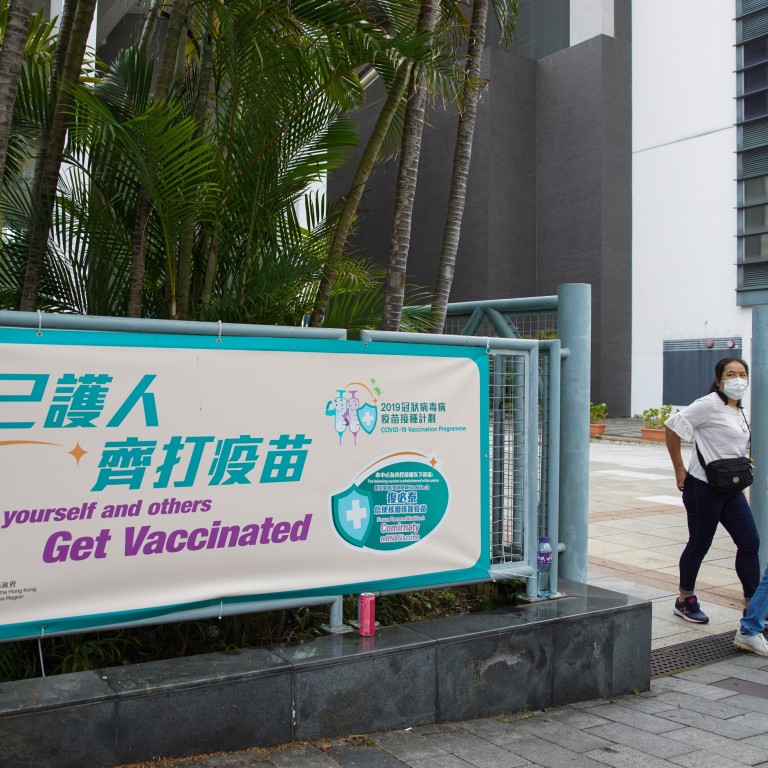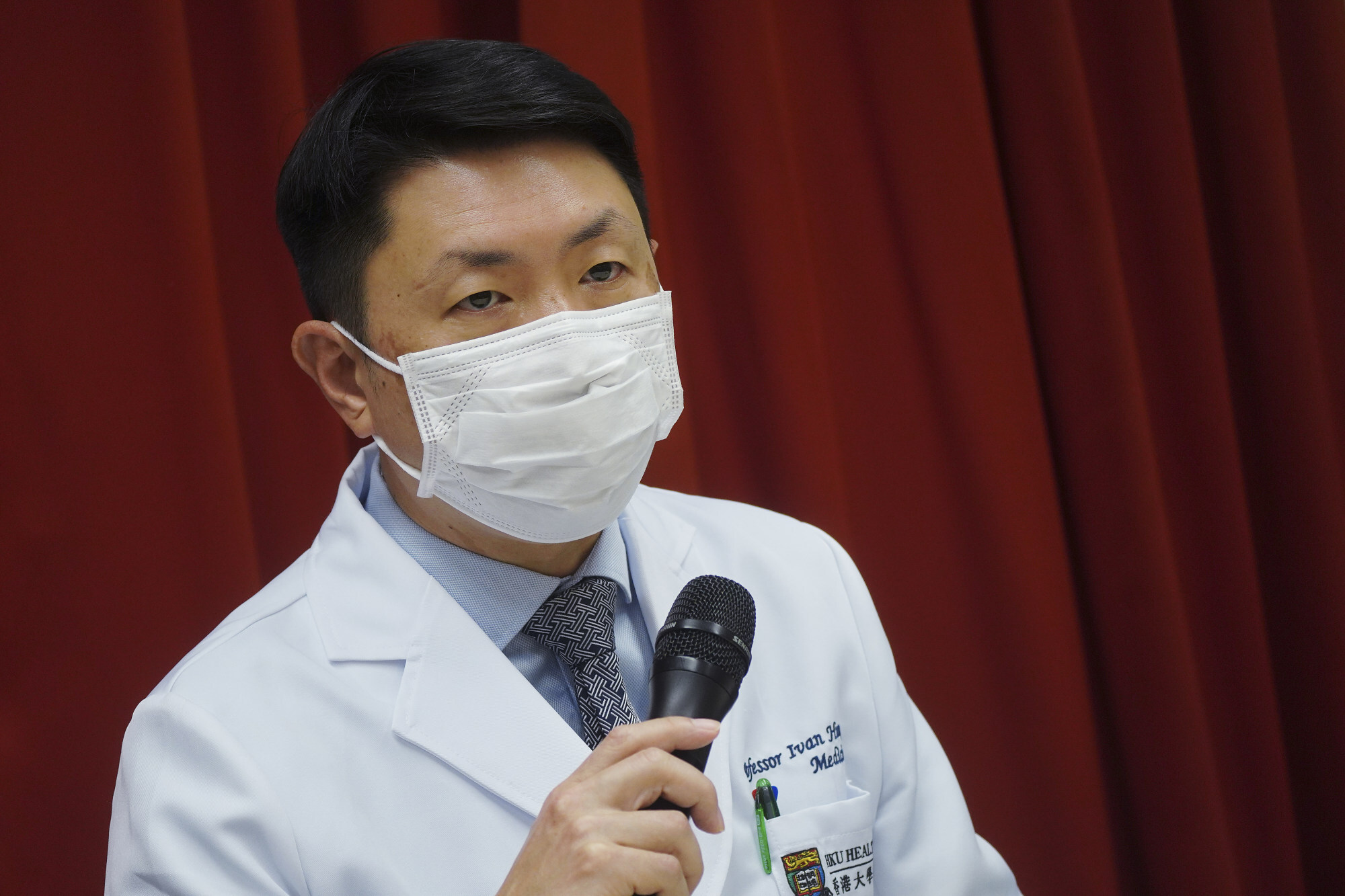
Coronavirus Hong Kong: vaccines are safe for children, but committee will closely track any adverse reactions, leading expert says
- Professor Ivan Hung says the expert committee on vaccine reactions will add more paediatricians and heart specialists, with jabs for children as young as 12 beginning on Monday
- The remarks from the co-convenor of the committee add to calls from political leaders and health authorities for more people to get their shots
Hung said the committee would increase the proportion of paediatricians and heart specialists monitoring reports of adverse effects, particularly after reports from overseas of some young people, particularly adolescent boys, experiencing myocarditis or pericarditis following their second dose of a vaccine. Both conditions involve inflammation of tissues in and around the heart, but are generally not life-threatening, and typically improve quickly.
“We will immediately explain to residents if there are really such cases, and clearly report the situation and how it is connected [to the vaccine],” Hung said in a television interview on Sunday. “We will of course monitor all reports of side effects, but we will focus particularly on heart inflammations, since there have already been reports out, even though it’s still quite rare.”
Echoing earlier comments from other health experts, Hung emphasised that it was safe for children to be vaccinated, pointing out that, compared with adults, side effects among children were roughly the same, or even slightly milder. Instances of heart inflammation, he added, were only seen in 16 out of every 1 million people, usually between 24 and 48 hours after vaccination. Of those who experienced the side effect, he said, 90 per cent had recovered within a week.
He went on to note that studies by the vaccine’s manufacturer had shown the efficacy rate was 1.8 times higher in children than in adults, and the protection against the coronavirus was likely to last longer. Children with regular food allergies were still able to get the shots, but those with allergies to multiple types of medication should consult a doctor before vaccination, he added.
Hong Kong’s vaccination rate remains stubbornly low, with only 1.2 million people, or 15.9 per cent of the city’s 7.5 million residents, fully immunised as of Sunday.
Individual bookings for vaccinations with the German-made BioNTech shots opened to children aged 12 to 15 on Friday, making the jabs available to an additional 240,000 Hongkongers. Authorities have also announced that group vaccinations at community inoculation centres will be available from June 21 onwards, and outreach services at local schools will start a week later at the earliest.
Hung said that children were a key part of the city’s vaccination drive, as they generally exhibited milder symptoms than adults but were still capable of spreading the virus to older family members. He went on to say that he hoped the age limit for vaccinations could soon be lowered even further, to age six or younger.
Hung also said that his committee would adjust its reporting procedure for deaths following vaccinations, partially walking back an earlier decision by the government to only disclose fatalities confirmed to be linked directly to the jabs.
The previous decision, he explained, was made after all the deaths reported in the first three months of the immunisation programme were found to be unrelated to the vaccines. Observers had previously raised concerns that the reporting of deaths following vaccinations, even those that were unrelated, had contributed to a misconception among the public that the jabs were unsafe.
However, in the interest of transparency, Hung said, the reporting mechanism would be adjusted again to ease any concerns.
“Maybe every one or two weeks we can reveal the statistics of how many [deaths] there were in the last 14 days, and what was the relationship [with the vaccines],” he added.

Meanwhile, in another a bid to put residents’ fears to rest, Hospital Authority director of strategy and planning Dr Libby Lee Ha-yun said on Sunday that patients registered at general outpatient clinics – most of whom have chronic conditions that require frequent check-ups – would be able consult their regular doctors as to whether they were fit for jabs. Bookings for the vaccination consultations will open on June 22, with the first appointments starting three days later.
“We know for Hong Kong to move past the pandemic, vaccination is really important. But we are also aware residents have concerns over whether their health situation makes them suited for vaccination and would like to consult a doctor,” she said.
A new survey by the NGO Society for Community Organisation appeared to drive home the importance of such consultations, finding that 90 per cent of elderly respondents had no current plans to get vaccinated, but nearly half of the sceptics would if they could speak to a doctor beforehand.
The survey of 201 needy Hongkongers aged 60 and above found that just 9 per cent had already got their jabs, and only 1 per cent had plans to. A third said they were still on the fence about getting vaccinated, while 57 per cent said they would not.
Hong Kong jobless rate to fall further, but full economic recovery hinges on Covid-19 vaccination, reopening borders: finance chief Paul Chan
However, 49 per cent of those with no current plans to get jabbed said they would be willing to do so if they were provided with a medical consultation.
The survey also found that only 10 per cent of the respondents had family doctors, and just 7 per cent got regular health check-ups, prompting the NGO to call for subsidies for the elderly to get health consultations to boost vaccinations.
Separately, the Federation of Trade Unions called on the government to set up a vaccination centre at the University of Hong Kong Shenzhen Hospital to allow city residents living just across the border to get their shots.
Even though mainland Chinese authorities have allowed Hongkongers with resident permits to get coronavirus jabs for free, only eight hospitals were offering the service with limited capacity.
Hong Kong confirmed no new coronavirus cases on Sunday. On Saturday, the city confirmed three new imported infections, bringing the tally to 11,877, with 210 related deaths.

